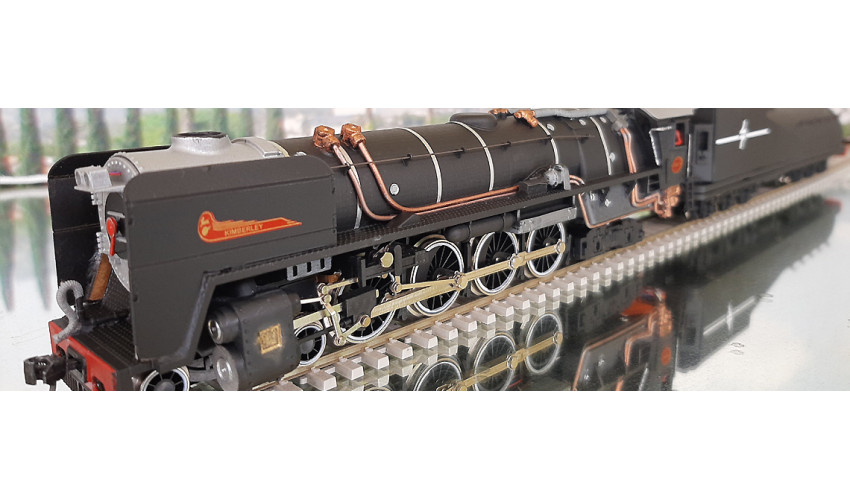Ready
to run HO scale 1:87 DC (analogue) DCC decoder can be fitted
Colourful
paint and lettering schemes
Fully
assembled
Use
with any HO Scale train set
Body-mounted
Kadee magnetic knuckle couplers
RP-25
metal wheels
We recommend the following curves to run 8 fixed coupled driving wheel loco's
and use long turnouts for trouble free train control
ST235, 00/H0 Peco Setrack Code 100, Curve radius 572mm, angle 22.5º(R4) Dark Green
ST231, 00/H0 Peco Setrack Code 100, Curve radius 505mm, angle 45º(R3) Light Green

South African Class 25NC 4-8-4
The Class 25NC non-condensing and Class 25 condensing 4-8-4 Northern type steam locomotives were designed by the South African Railways (SAR) under the direction of LC Grubb, Chief Mechanical Engineer of the SAR from 1949 to 1954, in conjunction with Henschel & Son of Kassel in Germany who designed the condensing apparatus and the condensing tender of the Class 25 sister locomotive.[3] Between 1953 and 1955,eleven Class 25NC locomotives were built by the North British Locomotive Company (NBL) and numbered in the range from 3401 to 3411 while 39 locomotives were built by Henschel and numbered in the range from 3412 to 3450.
Characteristics
The Class 25NC was superheated and used piston valves actuated by Walschaerts valve gear. Timken roller bearings were used throughout, including on the three-axle tender bogies, the coupling and connecting rods as well as the crosshead gudgeon pins, while the locomotive's leading bogies and coupled wheels had Cannon-type axle boxes. Compared to earlier SAR practice, a novelty was the adoption of mechanical lubrication. A sixteen-feed lubricator was driven off the expansion link trunnion. The cylinders and frames were cast in one piece by Commonwealth Steel Company in the United States. The steel cylinders and steam chests were fitted with cast iron liners. Being entirely mounted on roller bearings, very little effort was required to move these locomotives.
The Alligator type crossheads were split on the vertical centre line and clamped on to the end of the piston rods, which had three coned rings engaging in grooves in the crossheads. The original coupling rods differed from the usual in being three separate rods, thereby doing away with four knuckle joints and pins.
The multiple-valve superheater header was of the Melesco type. The boiler was fitted with four Ross-pop safety valves, each 2
1⁄2 inches (64 millimetres) in diameter, and two Hopkinson boiler blowdown cocks on the firebox wrapper, one on each side. Feedwater was delivered to the boiler by two Friedmann vertical type non-lifting injectors, each with a capacity of 5,200 imperial gallons (23,600 litres; 6,240 US gallons) per hour.
The locomotive was equipped with a Type EW1 tender which was equipped with a mechanical stoker of which the engine was mounted on the tender. The tank had a water capacity of 10,500 imperial gallons (47,700 litres; 12,600 US gallons) and the coal bunker a capacity of 18 long tons (18.3 tonnes; 20.2 short tons). The tender frame was also a one-piece steel casting and was a water-bottom frame, with the frame itself forming the bottom of the tank instead of being a separate tank and frame as in previous designs.
SAR Class 25NC EW2 (Worshond) Steam loco
- Brand: Mini World Models (South Africa)
- Product Code: SAR Class 25NC EW2 (Worshond) Steam loco
- Availability: In Stock
-
R9,500.00
Available Options
Tags: SAR Class 25NC EW2 Steam locomotive 4-8-4






